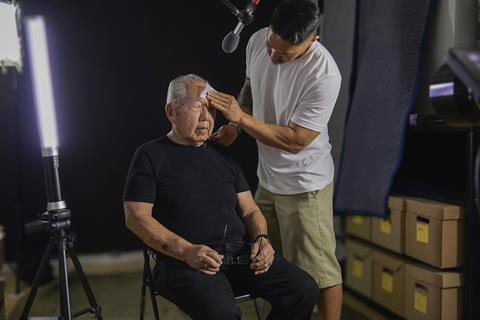Portrait of Asian American filmmaker Robert M Nakamura by his son, Tadashi

Dir: Tadashi Nakamura. US. 2024. 93mins
Tadashi Nakamura’s intimate documentary focuses on his filmmaker father Robert A. Nakamura, who, as well as being the ‘godfather of independent Asian American cinema’ is also a beloved dad, husband and grandfather. The close relationship between filmmaker and subject turns this planned celebration of a filmmaking legacy into something more complex, with the presence of the camera enabling father and son to open up in ways that surprise them both. Having premiered in Sundance’s US Documentary competition, Third Act will next play Santa Barbara and should go on to a healthy festival career, if not specialist distribution.
Emotions run high at times
As filming begins in 2020, Tadashi — whose documentary Jake Shimabukuro: Life on Four Strings won a Gotham a decade ago — articulates the acute responsibility he feels with this particular project. “My whole life I always knew I had to make a film about my father,” he says. “I don’t want his work to be forgotten.” Initially at least, the work is the focus; we see Robert — who is diagnosed with Parkinson’s a year into filming — pottering in his office, sorting negatives, guiding his son on camera and microphone placement. There are also clips from Robert’s films, including 1975’s Wataridori: Birds Of Passage (which he made about his own immigrant father) and 1980’s Hito Hata: Raise The Banner, about the Japanese American experience.
Just as issues of cultural identity informed Roberts work, they also become the nucleus of Third Act — so named as it depicts the ‘third act’ of Robert’s life. Robert uses his son’s camera as something of a confessional, expressing deep sorrow as he speaks about the time he spent as a young child in Manzanar, one of 10 internment camps where Japanese Americans were incarcerated during the Second World War (and the subject of his 1972 short Manzanar). Robert also discusses the everyday racism that confronted him when his family returned to post-war Los Angeles.
As Tadashi learns more about how his father’s past shaped his character, and his creativity — Robert turned to photography and filmmaking as a means of protest, becoming a key player in the anti-war movement during the 1970s — we can also see how a young Robert was also uneasy with his Asian ‘otherness’.
This is also a fascinating look at the art of filmmaking itself, with Tadashi leaving in many candid moments — discussions over whether they should recreate unfilmed moments, agonising over whether he should document family gatherings or simply savour time with his father while he can. These questions become more acute as his father’s illness forces him to confront difficult ideas of mortality and loss.
Emotions run high at times, but Tadashi and editor Victoria Chalk maintain a balanced focus, and keep Robert at the centre of his story. Tadashi’s mother, Karen — Robert’s second wife and long-time producer — also gets a lot of screen time, and remains pragmatic and insightful about the situation they face. Robert, too, is largely circumspect and a compelling narrator of his own life story, even if he is often concerned about whether he makes for an interesting subject.
Production company: Generation Films
International sales: Submarine, info@submarine.com
Producers: Eurie Chung, Tadashi Nakamura
Cinematography: Tadashi Nakamura, Lou Nakasako, Jess X Snow, Justyn Ah Chong, ‘Aina Paikai, Evan Kodani, Quyen Nguyen-Le
Music: Miles Senzaki















![[L-R]: Amanda Villavieja, Laia Casanovas, Yasmina Praderas](https://d1nslcd7m2225b.cloudfront.net/Pictures/274x183/6/4/1/1471641_pxl_20251224_103354743_618426_crop.jpg)








